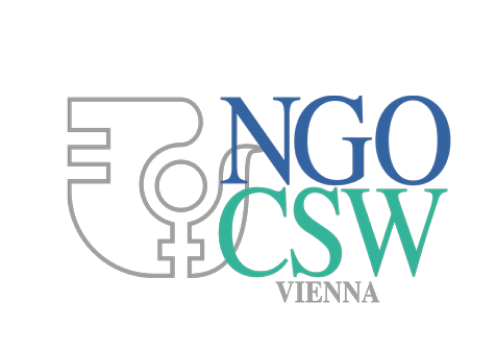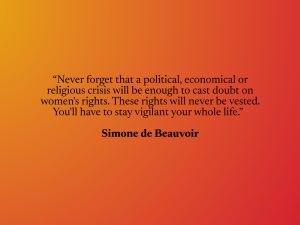NGO CSW Vienna Written Statement to 66th Commission on the Status of Women
Gender justice and climate justice are inextricably linked. Systemic and intersectional discrimination against women and girls threatens their human rights to life, food, water, health, education, livelihood and safety.
In the continuing climate crisis and as the world takes steps to recover from the COVID pandemic, we have an unprecedented opportunity to shift paradigms and transform the cycle of environmental destruction, economic insecurity, conflicts and violence to create a more gender-just, sustainable and peaceful world.
Countries must strive together and individually to uphold the goal of the Paris Agreement to limit the global temperature increase to 1.5 degrees or lower. We must ensure the future of people and planet, maintain biodiversity, limit habitat destruction and reduce risks of future pandemics. The time is now.
Women and children are at greater risk from environmental catastrophes, natural disasters, fires, floods and excessive heat. In natural disasters, women and girls are more at risk of drowning, often do not receive warnings, and may not be able to escape.Women who live in coastal areas are threatened by rising sea levels may be forced to migrate. In 2019, climate-related disasters displaced more than 30 million people, mostly women and girls. Effects of climate change contribute to the fragility of communities and countries, are exacerbated in conflict, and complicate efforts to prevent conflict and sustain peace.
Rising temperatures and increased stress lead to increasing aggression and violence in families and communities, as well as conflicts over increasingly scarce resources. Rates of gender-based violence increase following natural disasters; policies and programmes must address risk factors in the context of disaster risk reduction and climate change mitigation.
Climate change has a greater impact on women and girls who are reliant on natural resources for their livelihoods. Droughts, floods, fires, and soil degradation threaten the livelihoods of rural smallholder women producers’ food security and the nutritional status of their families and communities. Women face higher risks and greater burdens from the impacts of the climate crisis in situations of poverty, and the majority of the world’s poor are women.
Women’s unequal participation in decision-making processes compounds inequalities and often prevents women from fully contributing to climate-related planning, policy making, financing and implementation. Women have traditional knowledge, experience and abilities in protecting and repairing the earth, families and communities, in agriculture, conservation and natural resource management. The inclusion of women with diverse backgrounds in climate action and decision-making is necessary for more effective policies and programs.
Agenda 2030 notes the specific impacts climate change has on women. Like human rights, the Sustainable Development Goals are interlinked. Goal 5 (gender equality) must be taken into consideration in the attainment of all other goals, including Goal 13 (climate action).
Women’s participation at the political level has resulted in greater responsiveness to citizen’s needs and improved outcomes of climate-related projects and policies. Guiding principles must center the well-being of all people, ensure health and safety, and provide adequate and equitable financing.
Women are under-represented in advancing climate justice and in natural resource and environmental management, conservation, protection and rehabilitation, disaster preparations and response. Women and girls must have equal access to finance, technologies and knowledge, land rights and ownership, and access and control of natural resources for management and protection.
Education is vital to improve the capacity of girls and women to adapt to climate change and offer solutions and innovations. The economic stress induced by disasters and climate change can lead to child, early and forced marriages. Girls are often taken out of school to help with household chores, fetch water and wood, or do other work to increase income.
Countries in the Global North have historic responsibilities for the harms caused by extractive economies and the systems that created the current emergency. Countries in the Global South have contributed the least to the crisis, but are most impacted. Climate justice requires that the Global South receive fair compensation, financial support and debt cancellation.
Nothing less than a new paradigm is necessary: we call for an end to the exploitation of women’s unpaid work and of undervalued natural resources, to preserve the planet and guarantee a future for generations to come. We must have global recognition of the human right to a healthy environment. We must divest from harm to invest in care, centering actions on the health of people and the planet. Climate interventions must adequately account for women’s and girls’ realities in climate crises, such as violence, healthcare needs, and unpaid care and domestic work.
The time is now for all United Nations Member States to take gender-responsive action to end the climate crisis, achieve gender equality, empower women and girls, and create a more peaceful and sustainable planet.
The undersigned non-governmental organizations in consultative status with the Economic and Social Council, members of NGO Committee on the Status of Women Vienna and other partners, call upon the United Nations Member States to:
- Accelerate and strengthen implementation of the Convention on the Elimination of All forms of Discrimination against Women, Security Council Resolution 1325, Agenda 2030 in particular Goal # 5 on Gender Equality, and the Convention on the Rights of the Child; respect the Rights of Nature suggested by the UN General Assembly´s Resolution on Harmony With Nature;
- Listen to women: Increase women and girls participation in decision-making and leadership throughout climate and environmental governance and disaster response; set up more gender-balanced governing bodies to integrate gender sensitive climate change measures into national policies, strategies and planning, as per SDG 13.2 and the Paris Agreement;
- Integrate all women and girls, including indigenous women, in decision-making regarding sustainable resource management and the development of policies and programmes for sustainable development;
- Promote the mainstreaming of a gender perspective in all policies and programmes, including analyses of the different effects on women and men;
- Reduce barriers to climate financing for gender-just climate solutions, in particular small-scale, grassroots and rural projects, and increase funding for women-led initiatives;
- Increase women and girls’ access to information, education and training to enhance their knowledge, skills and opportunities for participation in environmental decision-making;
- Enhance the capacity of women and girls to build resilience to climate and disaster risks, mitigate climate change, and address loss and damage, including through community-based cooperative models;
- Ensure that climate adaptation and mitigation plans address the unique needs of women and the barriers to women’s full participation in the economy, including childcare and elder care services, occupational segregation, informal work, the gender pay gap, and other legal and social restrictions;
- Increase collection of gender-disaggregated data and apply this data to policy making and monitoring of policy implementation;
- Integrate a gender perspective in the design and implementation of sustainable resource management mechanisms, production techniques and infrastructure development in rural and urban areas;
- Support women’s equal access to safe water and sustainable and affordable energy technologies, such as wind, solar and other renewable sources, through participatory needs assessments, energy planning and policy formulation at the local and national levels;
- Take into account human rights and the empowerment of women and girls in defining and implementing gender-responsive national climate action plans;
- Protect, fund and support women’s civil society organizations, women human rights and environmental defenders; uphold the principles of climate justice agreed to in the Paris Agreement and ensure that the most marginalized groups do not bear the brunt of the climate crisis;
- Include women in the development of disaster preparedness and response plans that recognize the needs of women and girls; prioritize their health and safety; and include responses to gender-based violence;
- Transfer funding from military procurement expenditures into investments in peace to enable a better world for all people on a healthy, sustainable planet.
Signed by the following non-governmental organizations in consultative status to the UN Economic and Social Council:
African Action on AIDS
African Women’s Organization
European Union of Women
Federation of American Women’s Clubs Overseas
Graduate Women International
International Association of Democratic Lawyers
International Council of Jewish Women
International Council of Women
International Federation of Business and Professional Women
International Inner Wheel
Pax Romana
Servas International
Socialist International Women
Soroptimist International
Verein Südwind Entwicklungspolitik
Vienna Institute for Development and Cooperation Women’s Federation for World Peace International Women’s International Zionist Organization World Union for Progressive Judaism
Zonta International






